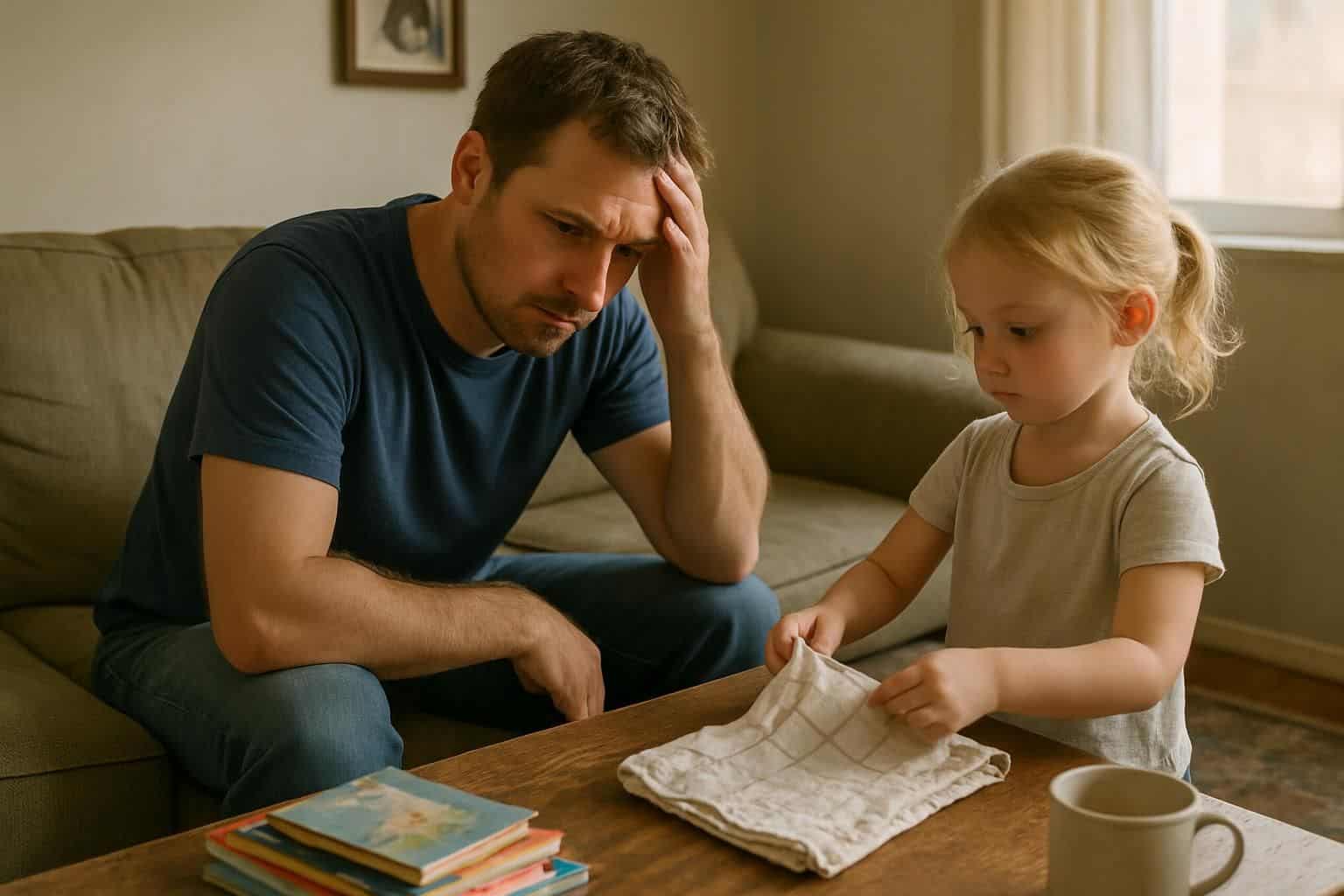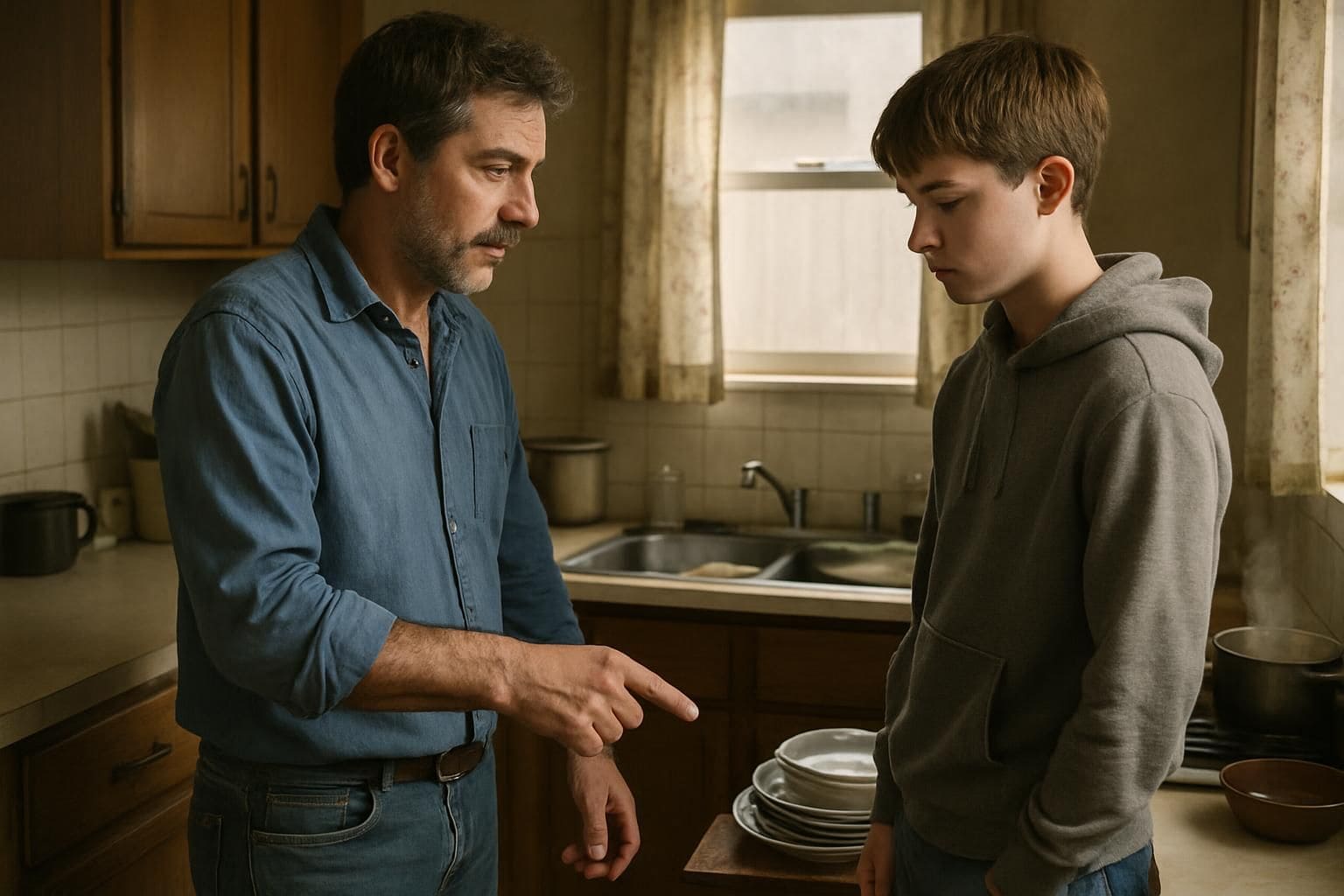Do you feel stuck because dad wants me to step into mom’s shoes after her passing? Parents sometimes place unfair demands on children when they’re grieving or struggling with senior care issues.
In this blog, you’ll learn seven clear steps, from setting firm boundaries to finding emotional and financial aid, to help regain your independence as a young adult. There’s hope ahead—keep reading!
Key Takeaways
If your parent expects you to step into a missing spouse’s role, it can damage your sense of self—and set up harmful family habits.
Clearly defining your boundaries isn’t selfish; instead, it preserves your emotional well-being, while still letting you care for your grieving parent.
Fathers who don’t address their grief face a 3.6 times greater risk of declining mental health, potentially causing them to lean too much on their children.
Use clear “I” statements when discussing boundaries, like, “I feel overwhelmed trying to manage mom’s former duties”.
Seeking help through family therapy or personal counseling provides a safe environment to mend family bonds, without losing your own independence.
Table of Contents
Understanding the Situation

When a dad expects his child to fill mom’s shoes, complex emotions swirl for everyone involved. Grief can cloud judgment, causing parents to place unfair burdens on their kids without even noticing.
Grieving and Loss in Families

Losing someone close shakes a family deeply, changing how everyone relates to each other. According to Dr. Murray Bowen’s family systems theory, roles within families often shift significantly after someone passes away.
Even surrounded by relatives, a grieving person can still feel lonely or misunderstood. This loneliness deepens if loved ones grieve differently—some handle grief through quiet reflection (“instrumental grief“), while others openly share their feelings (“intuitive grief“).
These varying responses sometimes lead to confusion or tension, right at a time when family closeness is key.

Society’s tough expectations place extra strain on grieving families, pushing them to heal on a strict, unrealistic timeline. On top of this pressure, families often struggle to find privacy as they work through deep pain together.
I’ve personally witnessed clients feeling rushed to “move on” just weeks after a parent’s death. Honest conversations and plenty of patience help family members understand each other’s unique grieving styles.
Everyone deserves space and flexibility to grieve differently, at their own pace, while still respecting personal boundaries. Finding this careful balance helps families stay connected and supportive through even the hardest times.
Misplaced Expectations from Parents

Grief can unexpectedly shift family roles in big ways. Parents facing the loss of a spouse might lean on kids to fill the empty spaces left behind. This shift often creates misplaced expectations—like a dad counting on his daughter to carry out mom’s usual duties.
Many fathers find household chores and emotional needs challenging after losing their partner. As a result, they might ask their kids to cook dinner or manage family issues, placing responsibilities on young shoulders they’re not ready for.
It’s easy for parents to overlook that their children have their own dreams, goals, and needs. They might expect you to pause your college plans or delay your independence, just to manage family demands.
This unhealthy pattern is known as parentification—where you’re expected to take on adult tasks before you’re truly ready. As a mature too young child, you may feel pressured into making decisions that suit your parent instead of yourself.
Setting clear boundaries helps prevent bitterness and teaches others how you’d like to be treated. Your dad must recognize you can offer support and love without becoming your mother’s replacement.
Setting boundaries isn’t about rejecting your father’s needs—it’s about protecting your right to grow into your own person while still being a loving daughter.
Emotional Impact on the Child

Children often feel trapped between their own needs and a parent’s demands to fill a missing role. This pressure creates a mix of guilt and confusion as they try to meet these unfair wants while still growing into their own person.
Feelings of Guilt and Confusion

Guilt can hit pretty hard, especially if your dad expects you to take over your mom’s responsibilities. It can leave you feeling torn—caught somewhere between your father’s expectations and wanting to live your own life.
This pressure leads to confusion, making it tough to understand exactly where you stand within the family dynamic. Lots of young adults struggle with feeling pulled in two directions: wanting independence, but dealing with the guilt of being responsible at home.
Parents who rely on guilt, even without realizing they’re doing it, can cause lasting harm for themselves and their kids.
Maybe your dad makes little comments about how you owe him for college tuition or even jokes about paying him back for diapers. Using family duties as debts you must repay hurts your personal growth—and that’s not fair.
Your emotions are valid. In healthy families, people don’t keep track of who owes what, and parents definitely shouldn’t demand repayment for simply doing their job. By setting solid boundaries, you protect your emotional health, breaking the hurtful cycle of guilt.
I’ve experienced similar struggles myself, like the pressure I faced from being forced by my brother to handle household responsibilities after our mom left.
Struggles with Identity and Boundaries

Many young women struggle between their own needs and a father’s pressure to step into a mother’s shoes. This tension can spark a serious identity crisis. You end up cooking dinners or managing household chores that shouldn’t be yours to handle.
Your college dreams and personal ambitions fade into the background, while confusing emotions pile up. This conflict between your true self and what others expect can deeply harm your sense of identity.
Setting healthy boundaries preserves your freedom and emotional well-being. Young women often experience guilt if they try to place limits on parents who depend too heavily on them.
Drawing clear lines helps define where family responsibilities stop and your personal life starts. Family roles can easily overlap—making you feel like your father’s happiness is your burden.
To escape, you need to recognize your right to pursue your own future without rushing into adult responsibilities too early.
The first act of courage is to draw a line between yourself and the parent who wants to use you as an extension of themselves.
Why This Dynamic Occurs

Families often slide into unhealthy patterns when grief goes unaddressed. A dad might push his child to fill mom’s shoes due to his own pain and the social pressures that tell men they can’t handle household tasks alone.
Unresolved Grief in Parents

Parents who haven’t dealt with their grief often place extra burdens on their children. Research finds that fathers with unresolved grief face a 3.6 times higher risk of worsening mental health, while mothers have a 2.9 times greater chance.
This sorrow doesn’t simply go away—26% of parents still experience intense grief 4 to 9 years after their loss. For example, dads might assume you’ll step in to cook family dinners or handle household tasks previously done by mom.
Sleep troubles can become a big red flag for grieving fathers, carrying a 6.7 times higher risk of sleep disruptions. Such unresolved sorrow can directly reduce quality of life and raise anxiety and depression.
I saw this clearly with my uncle after he lost his wife—he expected my cousin to handle all the cooking and shopping without ever really talking about it. Setting firm boundaries can help you keep your independence, while still letting you support your loved ones on your terms.
Cultural or Familial Pressures
Family expectations can place heavy burdens on young women, forcing them into roles they’re not prepared for. In some families, fathers push daughters to step into the mother’s role, especially if she’s absent.
This often occurs in strict religious households that require girls to cook meals and handle chores, even before they’re fully capable. I’ve watched a friend go through this struggle—she had to skip college to raise her siblings after losing her mother.
Her dad lacked basic home skills, so he placed all those responsibilities squarely on her shoulders.
The hardest part isn’t the work itself—it’s the guilt they make you feel when you try to set limits.
In many cultures, the pressure on young women is even stronger. Serbia is a clear example—young girls often face community pressure to have babies at an early age. The real-life story of “Miss Circus” highlights this well: her own father insisted she have a child at only 17 years old.
These expectations undermine a young woman’s independence, ignoring her freedom to make personal decisions. Often, family demands conflict directly with individual growth, particularly in homes ruled by macho attitudes and old-fashioned gender roles.
How to Navigate the Situation

Facing a dad who wants you to replace mom calls for clear action steps. You can learn to set firm limits while still showing care for your father’s grief.
Setting Healthy Boundaries
Healthy boundaries keep your mind healthy—and stop damaging family behaviors. You can say “no”, clearly and strongly, to responsibilities that aren’t yours. Many adults feel guilt at first, especially if parents expect them to take on roles meant for spouses.
Defining clear expectations around visits, phone calls, and house chores reduces stress for everyone involved. As you firmly communicate what tasks you will or won’t perform for your dad, family interactions will naturally change.
Your time is your own—it doesn’t belong exclusively to your father’s demands. Hiring cleaning services or scheduling meal deliveries can help your father become more independent, while still preserving your own freedom as a young adult.
You might begin simply by saying, “Dad, this stops now. I’m not your wife or your maid”. A direct approach may seem harsh initially, but it makes room for honest talks about how you feel.
Even consumer protection laws exist to support your right to personal boundaries within family ties. The aim isn’t distance or separation—but creating mutual respect that benefits everyone.
Open Communication with Your Father
Opening up to your dad about boundaries can feel tough—but it’s worth the effort. Go in calmly, choosing a peaceful moment instead of a tense argument. Use “I” statements to clearly share how you’re feeling without sounding accusing.
For instance, say something like, “I feel overwhelmed handling mom’s responsibilities”, rather than, “You always treat me like I’m mom”.
Many daughters dread feeling forced to talk on the phone with their dads about sensitive subjects. But having these conversations face-to-face usually ends up being far more effective.
I had to sit down with my dad once and gently tell him I couldn’t keep being his personal assistant—setting that limit actually saved our bond.
Bring real examples to help your dad clearly see your viewpoint. If he’s expecting you to cook full meals or run the home, explain how those chores impact your college goals or your freedom as a young adult.
Suggest practical alternatives, like signing up for a meal delivery service. One woman directly told her father, “Dad, this stops now—I’m not your maid, and you’re definitely not my husband”.
Once firm boundaries are openly set and respected, family relationships tend to become healthier and more positive.
Seeking Support from Trusted Individuals
Talking openly with your dad goes smoother if you have people in your corner. Trusted individuals bring comfort and strength during stressful family times. Friends, mentors, or relatives can offer fresh insights about the situation.
They might be able to notice habits you’ve overlooked—or suggest helpful new approaches to handle your dad’s expectations. Plenty of people dealing with similar parent struggles feel stronger with one or two reliable supporters by their side.
The right support system acts as both your mirror and your shield when setting boundaries with family.
Support groups exist online and face-to-face for adults managing complicated family roles. These groups allow you to openly share feelings and experiences without judgment. Discussing boundary-setting tips with people who’ve been there can make things clearer.
The choices you make about college—and your life in general—are yours to decide, not your parent’s. Trusted grown-ups can guide you in setting clear boundaries, sticking to them, and caring for your emotional well-being every step of the way.
The Role of Professional Help

Professional help offers a safe space to work through complex family issues. A trained therapist can guide both you and your father toward healthier patterns without taking sides.
Benefits of Family Therapy
Family therapy can make a real difference for families caught in unhealthy habits. I’ve seen how sessions bring people together, allowing them to tackle problems that hurt everyone involved.
The therapy stays focused on healing rather than finger-pointing—and this gentle approach helps a lot. For instance, my family went to therapy to handle discussions about paying for college.
It helped us all talk openly, respecting my need for independence as a young adult.
In therapy, you learn clearer, kinder ways to communicate and set healthy boundaries. This becomes especially important after grief or loss shifts roles in a family. Therapists create comfortable, safe spaces—everyone can share feelings openly, without fear or judgment.
Many families even discover helpful groups and supportive resources to lean on during difficult times. These extra resources provide tools and guidance that strengthen bonds, helping each member honor one another’s feelings and personal limits.
Individual Counseling for Emotional Healing
Group therapy helps everyone heal together, but individual counseling gives you personal space to deal with your own emotions. Working one-on-one lets you explore difficult feelings about your dad’s expectations privately, without guilt or added stress.
Research indicates parents who don’t process grief face serious health issues—in fact, fathers carry a 3.6 times higher risk of declining mental health. A qualified therapist can safely guide you through these challenging emotions.
Healing doesn’t happen overnight, yet the effort creates lasting improvement. I struggled with a similar issue—my dad expected me to step into the role my mom once held. Therapy taught me how to clearly set boundaries while still expressing care.
Finding this careful balance allowed my own identity to strengthen naturally. Gaining independence as a young adult involves putting your own needs first—this isn’t selfish, it’s essential to form healthy relationships.
Selecting the right counselor will help you build confidence and skills to set limits while remaining connected to your family.
Moving Forward

Healing takes time, but your path forward can include both self-care and family connection. Your story doesn’t end with setting boundaries—it begins a new chapter where you honor yourself while building healthier relationships.
Rebuilding Relationships with Balance
Creating a balanced relationship with your dad, especially after setting new boundaries, takes time and patience. Small, simple steps work best—like short visits or quick phone calls with clearly defined start and end times.
Many women feel less anxiety and anger once they stop trying to become their father’s caregiver or replace their mother. Your main goal isn’t breaking ties. Instead, you want to build a healthier family relationship, staying a daughter instead of turning into a parent substitute.
Honest conversations about college costs and your desire for independence can make things smoother for both of you.
Family bonds naturally shift as you stand firm on how you’ll spend your time and energy. Personally, my relationship with my dad got better after I stopped supporting behaviors that made him overly dependent on me.
The best approach lies somewhere between total separation and fully giving up your own needs. Achieving this balance helps you respect your dad while protecting your space to grow as a young adult.
At first, your father might push back a bit—but many parents soon learn these limits actually help the relationship grow stronger, not weaker.
Focusing on Personal Growth
Personal growth begins from within. Taking personal time isn’t selfish—it’s crucial for your mental well-being. Each day, set aside moments to reflect on your emotions regarding your family’s interactions.
This habit helps you build inner resilience, separate from what your dad might expect or need. Your own development matters just as deeply as that of anyone else at home. Try out a new hobby, meet different people, or learn a skill that doesn’t involve household duties.
Small steps like these help set clear lines between you and complicated family roles.
Self-care creates a foundation for healthy boundaries. Many young adults notice their independence blossom as they focus on their personal journey. You can still deeply care for your father and politely refuse tasks that aren’t your responsibility.
Finding this balance lets both you and him heal, grow, and move ahead positively. A strong support network makes a huge difference as you work through tricky family patterns. Next, we’ll look at ways the parent-child roles might shift over the next several years.
How Will This Dynamic Evolve in 2025?

Family dynamics will evolve significantly by 2025, as parents adjust to changing social norms. The bond between parents and children will become more balanced, each side respecting the other’s needs and boundaries.
Fathers who previously placed kids into traditional “mom” roles will now explore healthier, more caring forms of connection. Hybrid parenting styles—which blend a mother’s warmth and a father’s structure—will drive these changes, helping families bond better.
Tech tools will also shape how family members discuss boundaries and needs. Young adult independence will become increasingly valuable, and parents will embrace digital communication to stay connected without being intrusive.
Shared financial matters, like college costs, will have clear agreements in place to avoid confusion. Mental health will become a central focus for families, creating room for open conversations about feelings and expectations.
This openness will support adult children in setting fair yet loving boundaries, helping maintain close family relationships.
People Also Ask
How can I tell if my dad wants me to fill mom’s shoes?
Your dad might start expecting you to handle tasks that used to be your mom’s responsibility. He might lean on you emotionally, ask you to run the household, or expect you to do chores beyond what’s fair at your age.
Should I pitch in for college if dad expects me to act like a parent?
Covering college costs falls under your dad’s responsibilities—not yours. Sure, being helpful here and there is thoughtful, but don’t sacrifice your education or step into parental financial roles. Your top priority right now is school.
What is the best way to set boundaries with my dad?
Open up a calm and honest conversation. Clearly let your dad know how you’re feeling. Explain what tasks you’re okay handling, and gently point out duties that stretch beyond your comfort zone or feel more like parenting.
Do parent-child relationships come with legal guidelines?
Family relationships don’t have official terms like legal agreements—but laws do protect kids from accepting adult tasks too soon. If things feel way out of balance or too demanding, reach out to your school counselor or family counselor for advice.
References
https://whatsyourgrief.com/family-misunderstanding/
https://time.com/7279374/how-to-set-boundaries-parents/
https://www.propelwomen.org/content/a-grownups-guide-to-boundaries-with-parents/gjeboe
https://www.boundariesbooks.com/blogs/boundaries-blog/let-go-of-guilt-centered-parenting
https://www.choosingtherapy.com/setting-boundaries-with-parents/ (2022-08-17)
https://www.amazon.com/Reclaiming-Your-Identity-Empowerment-Estrangement/dp/B0F2519TGV
https://pmc.ncbi.nlm.nih.gov/articles/PMC2645112/
https://strongwilled.substack.com/p/how-do-you-set-a-boundary-in-a-family
https://makeheadway.com/blog/how-to-set-boundaries-with-parents/
https://hopefulpanda.com/how-to-set-boundaries-with-a-narcissistic-parent/
https://taylorcounselinggroup.com/blog/set-boundaries-for-difficult-family-members/
https://apn.com/resources/benefits-of-family-therapy-during-treatment/ (2022-12-14)
https://www.medicalnewstoday.com/articles/family-counseling (2023-05-18)
https://pmc.ncbi.nlm.nih.gov/articles/PMC9542128/
https://positivepsychology.com/healthy-boundaries-worksheets/
https://confessionsofimperfectmoms.com/healthy-boundaries/
https://www.linkedin.com/pulse/how-navigate-parenting-styles-moms-vs-dads-2025-oq00e
